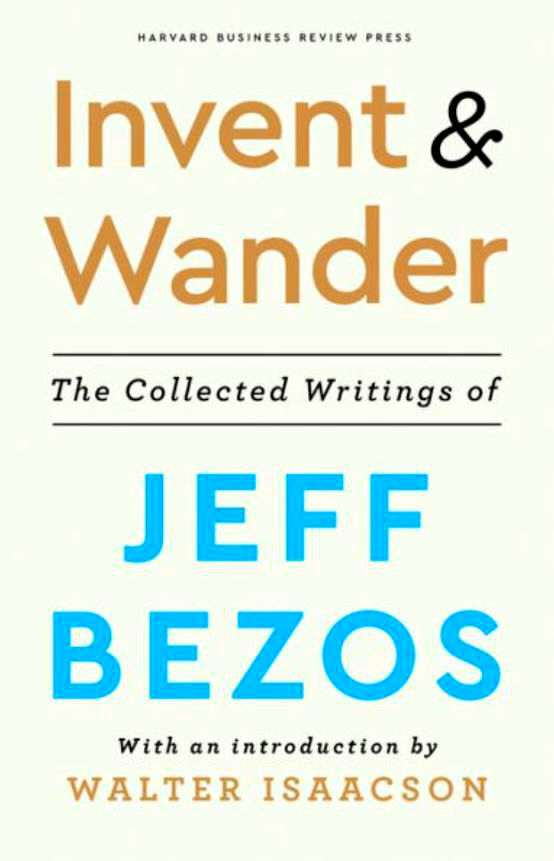Book review: ‘Invent and Wander’
Published 12:00 am Sunday, January 10, 2021

- BOOK REVIEW
“Invent and Wander: The Collected Writings of Jeff Bezos” by Jeff Bezos. Brighton, Mass.: Harvard Business Review Press, 2021. 256 pages, $28 (hardcover).
“I’m often asked who, of the people living today, I would consider to be in the same league as those I have written about as a biographer: Leonardo da Vinci, Benjamin Franklin, Ada Lovelace, Steve Jobs and Albert Einstein,” Walter Isaacson notes in his introduction to “Invent and Wander: The Collected Writings of Jeff Bezos.” “All were very smart. But that’s not what made them special. Smart people are a dime a dozen and often don’t amount to much. What counts is being creative and imaginative. That’s what makes someone a true innovator. And that’s why my answer to the question is Jeff Bezos. …
Trending
“Through this book you can learn many of the lessons and secrets revealed in Bezos’ interviews, writings and the annual shareholder letters he has personally composed since 1997,” Isaacson continues a little later: “Here are the five that I think are the most important: 1. Focus on the long term, 2. Focus relentlessly and passionately on the customer, 3. Avoid PowerPoint and slide presentations, 4. Focus on the big decisions, and 5. Hire the right people.”
Not a bad list, although I have been known to put together a few PowerPoints in my day.
“Invent and Wander” consists of an introduction (again, by Isaacson), followed by 45 chapters arranged in two major sections. “Part 1: The Shareholder Letters” contains letters Bezos sent to the shareholders of Amazon.com in April of each of the years indicated; whereas “Part 2: Life and Work” is derived from transcripts of interviews conducted with, and speeches given by, the celebrated entrepreneur and media mogul. Collectively they provide unique insights into what makes Bezos tick, and consequently, what motivates him to continue his never-ending quest for world domination.
“Invent and Wander” works on multiple levels. At its core, it is a window into the underlying philosophy, entrepreneurial architecture and commercial execution strategies of one of the most successful businessmen in history. On another level, it is a textbook – a detailed roadmap – that lays out how to connect the virtual realm with its brick-and-mortar predecessors (and competitors) in a highly effective, efficient and complementary manner. Finally, the narratives, when taken collectively, provide a highly personal and exceptionally detailed portrait of a complicated human being who has been fiercely determined, from the moment he entered the game, to do things his way – and only his way.
Consider the following from “The Power of Invention,” his 2011 shareholder letter: “Invention comes in many forms and at many scales. The most radical and transformative of inventions are often those that empower others to unleash their creativity – to pursue their dreams. That’s a big part of what’s going on with Amazon Web Services, Fulfillment by Amazon, and Kindle Direct Publishing. With AWS, FBA, and KDP, we are creating powerful self-service platforms that allow thousands of people to boldly experiment and accomplish things that would otherwise be impossible or impractical. These innovative, large-scale platforms are not zero-sum – they create win-win situations and create significant value for developers, entrepreneurs, customers, authors and readers.”
As many readers are acutely aware, Bezos is the founder and CEO of Amazon, the third-largest company in the world in terms of 12-month trailing revenue (as of September 2020), behind only Walmart and China Petroleum & Chemical. What is lesser known is that he is also the founder of Blue Origin, an aerospace company working to lower the cost and increase the safety of spaceflight, as well as the Bezos Day One Fund, which was set up to help homeless families by creating a network of tier-one preschools in low-income communities. The owner of the Washington Post, he graduated summa cum laude, Phi Beta Kappa in electrical engineering and computer science from Princeton University in 1986 and was named Time Magazine’s Person of the Year in 1999.
Trending
One of the most appealing features of Bezos’s relatively short excursions into the inner workings of his psyche is the multidimensional approach that slowly comes into focus the further you delve into his prose. Each installment contributes an additional piece of the puzzle; what emerges is a holistic perspective on the man and the method to his madness. Take, for instance, the following excerpt from “Work-Life Harmony,” the 38th chapter and one of the most revealing.
“I know that if I am energized at work, happy at work, feeling like I’m adding value, part of a team, whatever energizes you, that makes me better at home. It makes me a better husband, a better father,” the author explains. “Likewise, if I’m happy at home, it makes me a better employee, a better boss. There may be crunch periods when it’s about the number of hours in a week. But that’s not the real thing. Usually it’s about whether you have energy. Is your work depriving you of energy, or is your work generating energy for you?”
“It’s a flywheel, a circle, not a balance,” he continues. “That’s why that metaphor is so dangerous, because it implies that there’s a strict trade-off. You could be out of work, have all the time in the world for your family, but be really depressed and demoralized about your work situation, and your family wouldn’t want to be anywhere near you. They would wish you would take a vacation from them. It’s not about the number of hours, not primarily. I suppose if you went crazy with one hundred hours a week or something, maybe there are limits, but I’ve never had a problem, and I suppose it’s because both sides of my life give me energy. That’s what I recommend to both interns and executives.”
As you can tell, I really enjoyed this one and highly recommend it to anyone who is looking for a role model to emulate, both professionally as well as personally. I came away feeling I genuinely know who Bezos is – and more than just on a superficial level; i.e., you know, as the guy many of us buy our books from. He truly is an authentic pioneer on the leading edge who shows no signs of slowing down anytime soon.
– Reviewed by Aaron W. Hughey, University Distinguished Professor, Department of Counseling and Student Affairs, Western Kentucky University.






